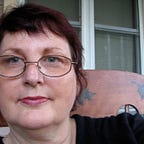Speaking Our Truth, Part Two:
The personal
We all construct multiple narratives of our lives to explain who we are and how we have come to be ourselves. These narratives may change in detail but overall represent our truth as we understand it. For instance, as I explain below, there came a moment of intense, shocking revelations when I had to radically alter the meta narrative I constructed over decades to describe and explain my relationship with my father. During the last three or so decades I have had to find a way to live with a second, very painful narrative contradicting the first, but still not drop the story I love.
When I say I “speak my truth” — I refer to a truth that exhorts itself against the lies and false interpretations other people have thrown at me without actually knowing me in any significant way. Including members of my own family.
As with scientific theories, truth can undergo radical transformations when we encounter anomalies previously inexplicable within the narratives we have used to structure our life stories.
In one chapter of my memoir, I desperately try to hold onto that first narrative despite the the new knowledge pressing hard against it and demanding its reconstruction. But it…
